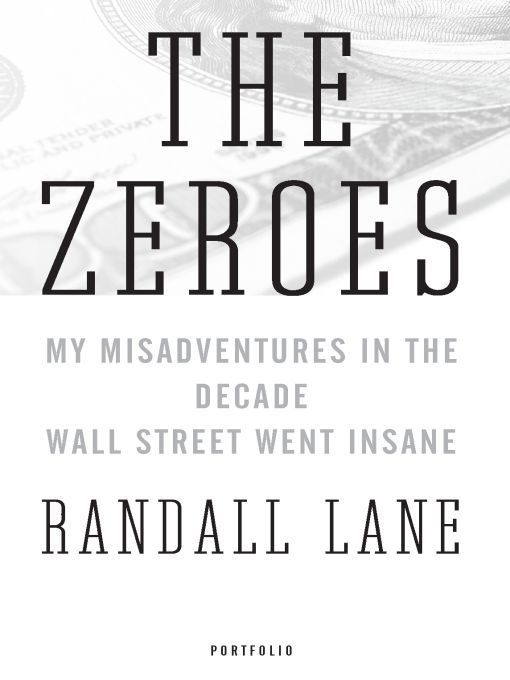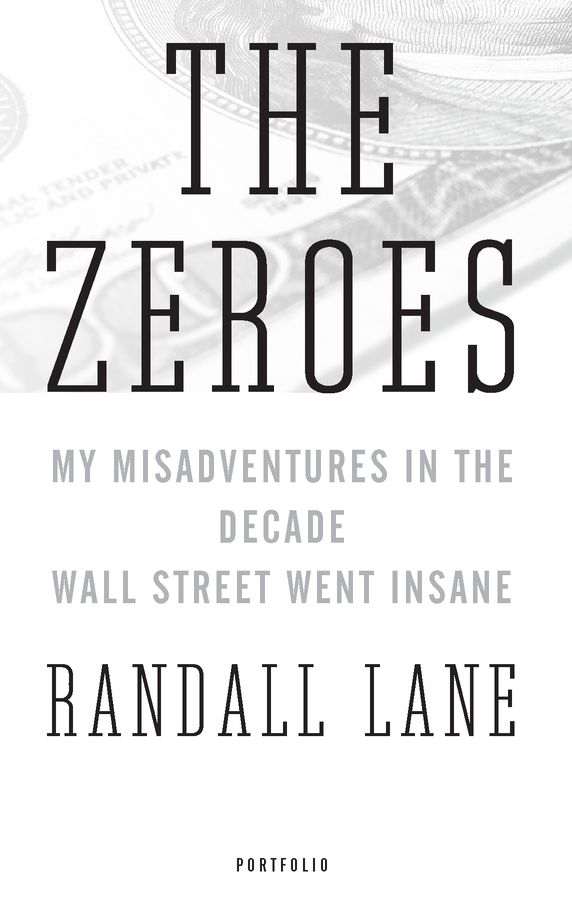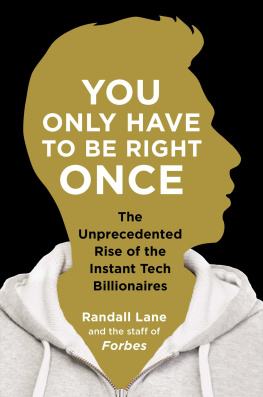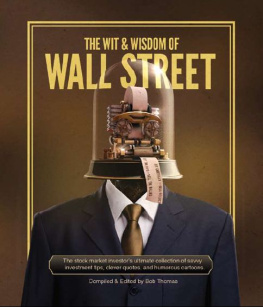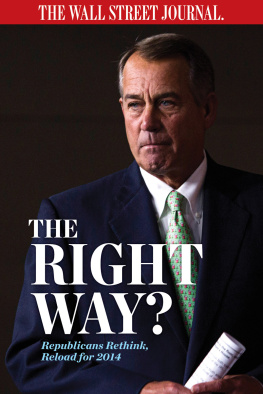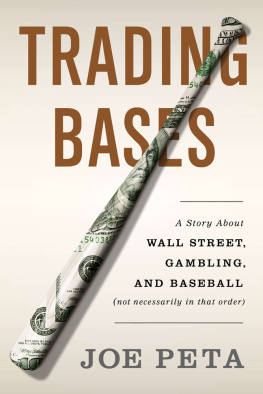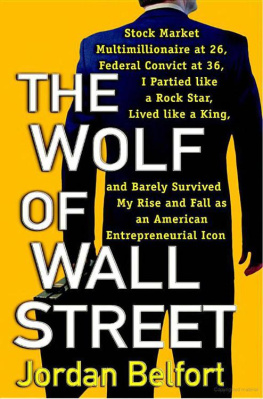Table of Contents
To Mom, for the unconditional trust and love, and the idea to write this
PROLOGUE
Anyone who has ever been on an active trading floor can testify to the din that can emanate from full-bodied, full-throated men locked in daily combat over large sums of money. On November 1, 2007, my company, Doubledown Media, publisher of Trader Monthly, Dealmaker, and Private Air, the magazines that had set the tone for the decades wanton earning and spending on Wall Street, stacked almost one thousand of the financial elite three layers high in New Yorks century-old Hammerstein Ballroom, a grand hall designed to challenge the Metropolitan Opera House acoustically, for our first-ever Wall Street Boxing Charity Championships.
We fattened them up, proffering beef tenderloin seared medium rare. We liquored them up, placing at each table a five-liter bottle of Imperia vodka, a just-launched premium spirit owned by a newly minted Russian oil billionaire who claimed to have rediscovered a nineteenth-century formula that Czar Alexander III had once decreed the standard for all vodka: winter wheat taken from the black soil of the Russian steppes, distilled with glacial water from Lake Ladoga, and twice-filtered through quartz crystals hacked from the Ural Mountains.
If our guests wanted a little privacy, they could sit in a $400,000 Mercedes Maybach, a three-ton rolling first-class cabin for those who had graduated from the burden of driving to lounging in a backseat outfitted with eighteen-direction adjustable leather seats, foot and head massagers, and a Champagne fridge in the middle armrest. If those venturing into our custom cigar tent wanted a nicotine fix, we foisted upon them unlimited $30 Zino Platinum Crowns, a blend of one Peruvian and three Dominican tobaccos, aged four to five years and wrapped in a leaf developed at a boutique plantation in Connecticut. We were providing the kind of full-sensory experience required to distract any attendee from noticing that we had lightened their wallets by as much as a thousand bucks each.
I was surely in the poorest one percent of those assembled, a guy who drove a dented 97 Subaru Outback. But as the CEO and editor-in-chief of Doubledown Media I had the best seat in the room to view my creation in all its craven glory. My ringside tablemates included Gerry Cooney, the gregarious former heavyweight contender whom wed paid $2,000, cash up front, plus cab fare, to mingle with the guests, and Emile Griffith, the former middleweight champ best known for tragically beating Benny the Kid Paret to death during a nationally televised bout in 1962. (Griffith, I discovered, suffers from dementia owing to a few thousand hits to his head, which made him extremely hard to understand. That helped explain his meager appearance fee$200, no cab fare.)
Halfway through the second fight, I pulled myself away from my famous rent-a-friends and gazed around. The collective wealth and conspicuous consumption was breathtaking, especially when compared to the scrappy style of our perpetually underfunded company. This was a world as innately foreign to me as a gorilla troop in the African plains. But over the past five years, I had gradually learned the language and the customs, and become, at first, a tolerated observer, a Jane Goodall with some cool magazines. As our products gained influence, the financial community slowly accepted me as a trusted insider. And now, as the markets ascended to unprecedented heights, I found myself, as Wall Streets scorekeeper, fueling the make-and-spend machine. I hadnt created the wealth in front of me. In order for my company to flourish, however, we needed to embrace it.
Eating, drinking, and consuming, the Wall Streeters arrayed before me were doing a fantastic job celebrating their status at the precise apex of our countrys financial pyramid. But judging from the almost primal noise now shaking the Hammersteins century-old foundations, our guests, in their Armani tuxedos and Brioni suits, had actually come for something even more innate than the steaks and vodka. They had come for blood. Preferably, it seemed, blood from the one group that almost everyone on Wall Street could agree embodied all that was evil and wrong with the world: the tiny substratum of their peers who made even more than they did.
Goldman... Sucks! the crowd thundered in unison. Goldman... SUCKS!
Poor Shane Kinahan, I thought, watching him march toward the boxing ring as the bagpipers hed personally hired for his entrance futilely tried to drown out the profanity now raining on him. A vice president at Goldman Sachs, an institution whose name was now being collectively mocked, Kinahan was guilty of a mortal Wall Street sin: inspiring jealousy. Once bonuses were doled out a few months hence, Goldman would pay its thirty thousand employees an average of $661,000 for 2007, more than any bank on the Street or similarly sized company in the world. It was a figure that took into account every secretary, janitor, cafeteria worker, and Town Car driver. Our crowd, of course, did far better: Kinahan was surely well into seven figures, and some of his colleagues would nudge past $100 million for the year. Rooting for Goldman Sachs was thus about as much fun as rooting for Kim Jong-il on Election Day in North Korea.
To make matters worse for Kinahan, he was fighting Josh Weintraub, who had the double advantage of a college boxing background and the underdogs chip on his shoulder. No matter that Weintraub was one of the biggest hitters on the Street, the guy who made millions running Bear Stearnss private label mortgage trading deskselling mortgages so junky that neither Fannie Mae nor Freddie Mac would guarantee thempackaged under a euphemism that made them sound as benign as Sams Club cola (Its just as good as Coke, but one-third the price!). The math in the room was just as simple: Bear versus Goldman. David versus Goliath.
Rather than tap gloves at the beginning of the round, as is traditional in amateur fights, Weintraub taunted Kinahan, sticking his face out the way a mongoose might bait a snake. Trinity Gym, a boxing specialist in New Yorks financial district, had spent four months training each of our fighters, and part of the mantra had been to put on a good show for the paying customers. If you were outclassing an opponent early, carry him a little bit, then take him out in the third round. Not Weintraub. He tore at Kinahan mercilesslya left cross for Kinahans secretary, who made three times more than Weintraubs secretary, a right jab for the three top earners Goldman had stolen from Bear the year beforefinally stunning him with a right hook that dropped the Goldman trader after ninety seconds.
The crowd cheered like it was V-E Day, led by a boisterous Weintraub entourage. He had personally forked out $65,000 for premium tickets for friends, family, and crew, followed by an after-party at a nearby club. As eight sets of boxers slugged through the night, traders and bankers streamed toward Hammerstein, unfurling rolls of hundreds in hopes of charming the check-in girls and buying their way into the capacity event. Via text messages and cell phone calls, The Word had gone out: Wall Street was celebrating tonight.
The past month had seen the Dow Jones Industrial Average surge past 14,000 points for the first time. Guys like Josh Weintraub were making fortunes by creating securities more complicated than the Rosetta stone and also far more valuable. And Bear had just beaten Goldman. For these guys

